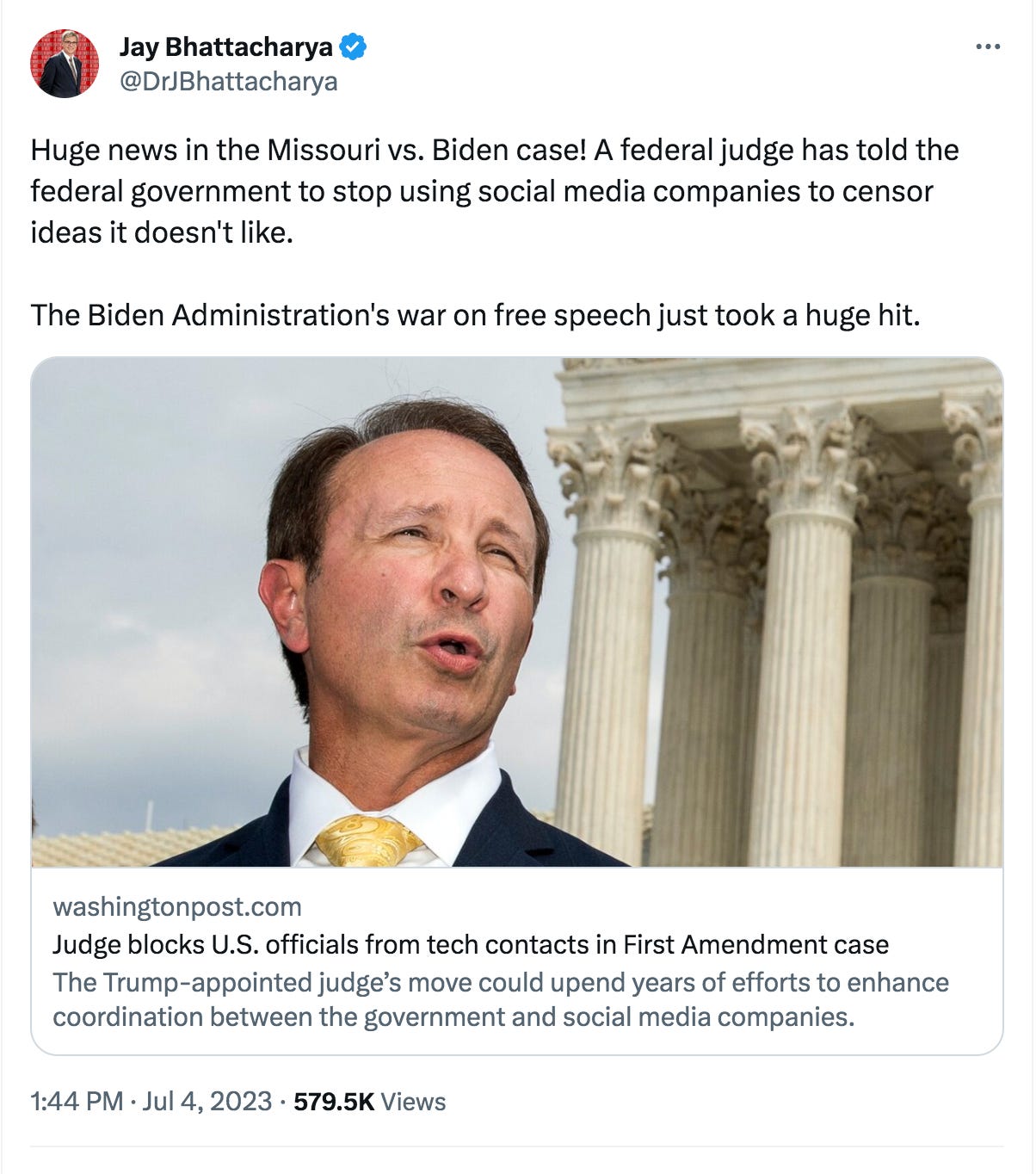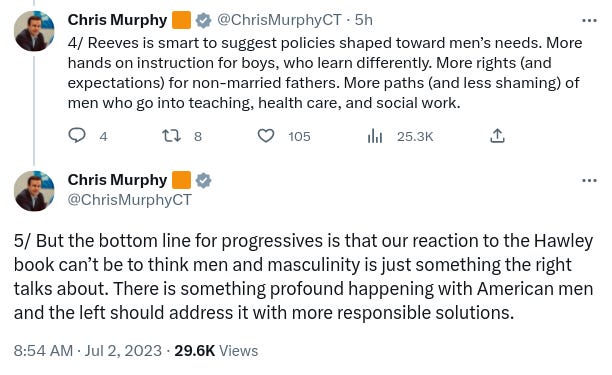E-Pluribus | July 5, 2023
Diversity, equity, inclusion, and hypocrisy; Affirmative Action's exceptions; and America's arc of redemption.
A round-up of the latest and best writing and musings on the rise of illiberalism in the public discourse:
Conor Friedersdorf: The Hypocrisy of Mandatory Diversity Statements
Based on the attention the I in DEI (diversity, equity, and inclusion) receives in comparison to D and E, it has come by its third-place position in the acronym honestly. But as Conor Friedersdorf points out in The Atlantic, given the way DEI statements are used to exclude undesirables from consideration for jobs in education, DEI might as well be DEE.
Perhaps the most extreme developments in the UC system’s use of DEI statements are taking place on the Davis, Santa Cruz, Berkeley, and Riverside campuses, where pilot programs treat mandatory diversity statements not as one factor among many in an overall evaluation of candidates, but as a threshold test. In other words, if a group of academics applied for jobs, their DEI statements would be read and scored, and only applicants with the highest DEI statement scores would make it to the next round. The others would never be evaluated on their research, teaching, or service. This is a revolutionary change in how to evaluate professors.
This approach—one that is under direct challenge in the Haltigan lawsuit—was scrutinized in detail by Daniel M. Ortner of the Pacific Legal Foundation in an article for the Catholic University Law Review. When UC Berkeley hired for life-sciences jobs through its pilot program, Ortner reports, 679 qualified applicants were eliminated based on their DEI statements alone. “Seventy-six percent of qualified applicants were rejected without even considering their teaching skills, their publication history, their potential for academic excellence, or their ability to contribute to their field,” he wrote. “As far as the university knew, these applicants could have well been the next Albert Einstein or Jonas Salk, or they might have been outstanding and innovative educators who would make a significant difference in students’ lives.”
At UC Davis, 50 percent of applicants in some searches were disqualified based on their DEI statements alone. Abigail Thompson, then the chair of the mathematics department at UC Davis, dissented from its approach in a 2019 column for the American Mathematics Society newsletter. “Classical liberals aspire to treat every person as a unique individual,” she wrote. “Requiring candidates to believe that people should be treated differently according to their identity is indeed a political test.”
More striking than her argument was the polarized response from other academics, captured by the letters to the editor. Some wrote in agreement and some in substantive disagreement, as is appropriate. But a group letter signed by scores of mathematicians from institutions all over the United States asserted, without evidence, that the American Mathematics Society “harmed the mathematics community, particularly mathematicians from marginalized backgrounds,” merely by airing Thompson’s critique of diversity statements. “We are disappointed by the editorial decision to publish the piece,” they wrote. Mathematicians hold a diversity of views about mandatory DEI statements. But just one faction asserts that others do harm merely by expressing their viewpoint among colleagues. Just one faction openly wanted to deny such dissent a platform. Are members of that progressive faction fair when they score DEI statements that are in tension with their own political beliefs? It is not unreasonable for liberal, conservative, and centrist faculty members to be skeptical. And many are.
Read it all.
Jay Caspian Kang: Why the Champions of Affirmative Action Had to Leave Asian Americans Behind
The Supreme Court’s affirmative action decision has been met with venomous cries of racism, but given the way Asian Americans have been elided from the responses, one is tempted to hear such charges as a case of methinks-the-lady-doth-protest-too-much. In the New Yorker, Jay Caspian Kang explains why, in many ways, affirmative action proponents had no choice other than quietly slipping Asian Americans under the bus.
Affirmative action, in my view, was doomed from that moment forward [1978, with Justice Lewis F. Powell, Jr.,’s opinion in Regents of the University of California v. Bakke] because it had been stripped of its moral force. It is one thing to argue that slavery, lynchings, Jim Crow laws, mass incarceration, and centuries of theft demand an educational system that factors in the effects of those atrocities. If that principle were to express itself in, say, a Black student who was descended from slaves and had grown up in poverty in an American inner city receiving a bump on his application when compared with a rich private-school kid from the suburbs, so be it. But that is not, in fact, how affirmative action usually plays out at élite schools. Most reporting on the subject—including my own, as well as a story in the Harvard Crimson—shows that descendants of slaves are relatively underrepresented among Black students at Harvard, compared with students from upwardly mobile Black immigrant families. It is easy and perhaps virtuous to defend the reparative version of affirmative action; it is harder to defend the system as it has actually been used.
Powell’s decision gave schools like Harvard—where, according to a study published in 2017, only four and a half per cent of the student body came from the bottom twenty per cent of the nation’s income earners and fifteen per cent of students came from families who make more than six hundred and thirty thousand dollars a year—the leeway to corrupt the original spirit of affirmative action and turn it into a counting game for rich kids. Harvard did not have to pursue such a comical vision of social justice. It could have vastly expanded its class sizes, relaxed its admissions standards, and cut off its pipelines from exclusive private schools. It could have opened its doors to hundreds of community-college transfers. If Harvard were truly committed to increasing access to an élite education, it could have invested a fraction of its fifty-three-billion-dollar endowment in free college-preparatory academies across America and guided hundreds of poor Black and Latino students through the university’s gates.
Harvard, of course, did none of this and chose instead to chase an absurd and empty vision of diversity that allowed it to stay as exclusive as possible. Institutional arrogance and the refusal to actually produce a defensible affirmative-action system made the university an easy mark for conservative legal activists.
Read it all here.
Gonzalo Schwarz: Dreaming Our Way Toward Redemption
In what is becoming an annual tradition, various public figures spent Independence Day trashing America. As Gonzalo Schwarz reminds us at Discourse Magazine, however, America was not founded as a perfect country, but rather has spent nearly 250 years striving to live up to the principles upon which it was founded, and the dream isn’t over.
Redemptive arcs can be about individuals, groups of people or even—as some religions teach—human souls as part of a redemptive arc with God. The United States is uniquely positioned, from a historical perspective, to represent the ultimate redemptive arc when it comes to the story of a nation. That’s where the American Dream comes in: As America’s central vision, it unifies us in our diversity and represents the journey of many people in pursuit of better, richer and fuller lives. It’s a journey that hasn’t been a smooth one.
The promise of all people created equal is what resonates more with our redemptive arc story: It’s a promise that did not fully take hold in America’s early days. The country was founded amid the grave injustice of slavery, and even though it wasn’t the main engine driving the founding of our nation, it represented a stain on the promise of equality for all. Slavery stood in direct opposition to the American Dream, since it kept millions from pursuing the limits of which they were, as James Truslow Adams wrote, “innately capable.” The circumstances of birth and position meant everything.
In that sense, our American story is one of ongoing progress toward redemption—working, for example, to redeem ourselves from the country’s codification and perpetuation of slavery. And as our story has progressed, events have unfolded and leaders have emerged to form our transformative redemptive arc.
[ . . . ]
Our redemption story may not be over yet, but momentous progress has been made, and maybe in the context of a nation, a redemptive arc is never fully achieved as there is always room for improvement—and even more so for a country as young as the United States, which is only turning 250 years old at the middle of this decade. Furthermore, it’s important to remember that as soon as we internalize a final victory, we can become complacent. But this amazing dream is still an ongoing experiment that we need to cherish and build on.
Read the whole thing.
Around Twitter
Stay tuned for more developments, but government’s collaboration with social media giants gets a smackdown from a federal judge on Independence Day:
Democratic Representative Chris Murphy skates onto progressive thin ice with some serious remarks about differences between men and women:
And finally, Harvard’s Lawrence Tribe decides it would be a good idea to use the Supreme Court’s recent decision on free speech to invoke Dred Scott. No, really:










